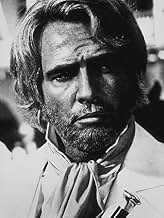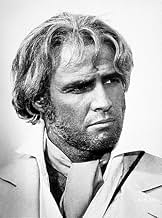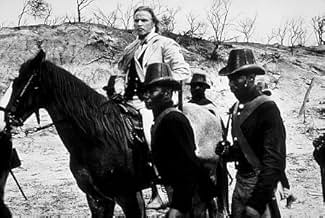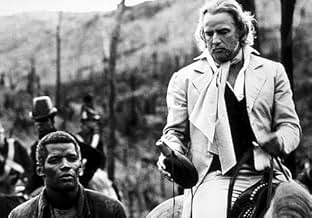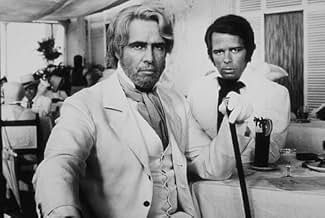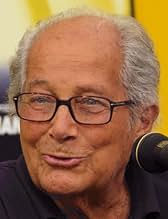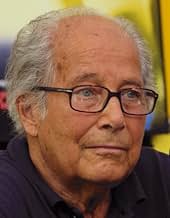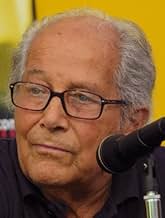अपनी भाषा में प्लॉट जोड़ेंIn 1844, a British mercenary helps the revolting slaves of an Antilles island colony gain independence from Portugal, but later returns to hunt down a local rebel leader and former protégé.In 1844, a British mercenary helps the revolting slaves of an Antilles island colony gain independence from Portugal, but later returns to hunt down a local rebel leader and former protégé.In 1844, a British mercenary helps the revolting slaves of an Antilles island colony gain independence from Portugal, but later returns to hunt down a local rebel leader and former protégé.
- पुरस्कार
- 5 जीत और कुल 1 नामांकन
- José Dolores
- (as Evaristo Marquez)
- Juanito
- (as Joseph P. Persaud)
- Soldier
- (as Alvaro Medrano)
- Engl. Major
- (as Alejandro Obregon)
- Lady Bella
- (बिना क्रेडिट के)
- Man on the ship
- (बिना क्रेडिट के)
- Ramón
- (बिना क्रेडिट के)
फ़ीचर्ड समीक्षाएं
Ten years pass, and the sugar industry now requires peace and stability on Quemada. The continuing guerilla campaign by the dispossessed blacks is harming profits. The very same English adventurer is once more despatched to the island, this time to hunt down and eradicate the revolutionaries he created.
Marlon Brando plays Sir William Walker in his best Fletcher Christian English accent and a blonde wig with a life of its own. His is a thoughtful performance, putting across the complexity of the man, a character who is undoubtedly cynical and unscrupulous, but who is also an emotional man and something of a political philosopher. He is certainly effective at what he does.
The direction of Gillo Pontecorvo is somewhat erratic at times. There are points where the narrative is confused, and the gold robbery which drives the plot somehow got left on the cutting-room floor. Jose Dolores' rise to power is the most significant event in the story, but we see nothing of it. During the voodoo carnival, two of the participants are wearing 20th-century soccer shorts. The film's central pivot, the passage of ten years between Walker's two visits to the island, is handled very sketchily by means of a few incongruous London scenes and a voice-over narration.
But there are good things, too. When Santiago's widow hauls her husband's body away, the masonry of the fort stands as a silent metaphor of colonial power - harsh, overbearing and sterile. Brando has some fine speeches, musing on the nature of political legitimism. The fire scenes are visually arresting (though it would have sufficed to have two or three guerillas being shot as they emerged from the burning sugar cane: seven or eight is labouring the point), and Walker is positively luminous against the tortured black shapes of the charred forest, showing in symbolic form that this man thrives on the suffering of the blacks, and that destruction is his natural element.
It is impressive the timing of director Gillo Pontecorvo to make and release "Burn!". In 1969, the South America was under military dictatorships promoted by the United States of America to improve their economical and political interests in the region. There are many parallel situations in the colonization process between what was happening in South America in that historical moment and in the fictitious island of Queimada in the previous century. Marlon Brando performs one of the most Machiavellians characters of the cinema history and very similar to the American advisors that supported the foregoing dictatorships (despite not using torture). His character is fascinating as well as his political capability to envision the consequences of his actions; he is indeed the personification of the thoughts and concepts of Machiavelli in "The Prince". My only remark is the use of English language in a Portuguese colony; Mr. Pontecorvo should have casted actors that speak Portuguese to be more accurate. My vote is eight.
Title (Brazil): "Queimada!" ("Burn!")
I have watched the film several times and loved Gillo Pontecorvo's direction of the scenes at the port, which are one of my favorite sequences in cinema. Pontecorvo wanted Brando to create an evil figure of "Sir" William Walker, who was a real person though not a British knight. He was an American mercenary who even went to Indo-China. Brando apparently argued with Pontecorvo that the character instead of a clear-cut evil figure should be more ambiguous and this led to major differences between the two. On viewing the film, it is evident Brando won the argument.
Franco Solinas, the screenplay writer, was a brilliant Leftist who contributed to Pontecorvo's success on "Battle of Algiers" and "Kapo." However, their films rankled the far Left and the far Right. Quiemada's script upset the Spanish government, and the filmmakers changed the details from a Spanish colony to a Portuguese colony. But Brando who probably was aware of the American connection of the lead character must have enjoyed the parallels of the story--knowing his personal love for the native Indian cause.
The film is a witty, cynical portrayal of colonial designs on impoverished poor. Sugar was the commodity in vogue then. A century later you could replace "sugar" with "oil." The film is replete with a brilliant speech penned by Solinas, spoken by Brando that begins by comparing the economics of having a wife versus a prostitute. He then ends the speech comparing the gains of a slave with that of hired labor. The political philosophy is unorthodox but hard hitting.
The visual effect of Brando's blonde hair and white clothes against the black natives is a visual metaphor. It is perhaps most anti-racist movie that I have seen with William Walker in all his glory unable to comprehend the political conviction and values of a native worker who refuses a chance to escape a cruel execution.
This film has a small but significant role for Italian actor Renato Salvatori.
I have seen hundreds of political movies--but this will remain my all time favorite. The film won Pontecorvo in 1970 the best director national award in Italy. The mix of Brando, Pontecorvo, Solinas, Salvatori and Morricone is a heady cocktail that will be a great experience for any intelligent viewer.
क्या आपको पता है
- ट्रिवियाMarlon Brando once said this film contains "the best acting I've ever done."
- गूफ़Portugal never had any colonies in the Caribbean. Its only American colony, Brazil, has no coast in the Caribbean.
- भाव
Sir William Walker: Gentlemen, let me ask you a question. Now, my metaphor may seem a trifle impertinent, but I think it's very much to the point. Which do you prefer - or should I say, which do you find more convenient - a wife, or one of these mulatto girls? No, no, please don't misunderstand: I am talking strictly in terms of economics. What is the cost of the product? What is the product yield? The product, in this case, being love - uh, purely physical love, since sentiments obviously play no part in economics.
[general laughter]
Sir William Walker: Quite. Now, a wife must be provided with a home, with food, with dresses, with medical attention, etc, etc. You're obliged to keep her a whole lifetime even when she's grown old and perhaps a trifle unproductive. And then, of course, if you have the bad luck to survive her, you have to pay for the funeral!
[general laughter]
Sir William Walker: It's true, isn't it? Gentlemen, I know it's amusing, but those are the facts, aren't they? Now with a prostitute, on the other hand, it's quite a different matter, isn't it? You see, there's no need to lodge her or feed her, certainly no need to dress her or to bury her, thank God. She's yours only when you need her, you pay her only for that service, and you pay her by the hour! Which, gentlemen, is more important - and more convenient: a slave or a paid worker?
- इसके अलावा अन्य वर्जनThe complete version of this film runs 132 minutes. A 112-minute version under the title "Burn!" was released in the USA and the UK.
- कनेक्शनFeatured in Pontecorvo: The Dictatorship of Truth (1992)
टॉप पसंद
- How long is Burn!?Alexa द्वारा संचालित
विवरण
बॉक्स ऑफ़िस
- US और कनाडा में सकल
- $4,31,817
- चलने की अवधि2 घंटे 12 मिनट
- रंग
- पक्ष अनुपात
- 1.66 : 1
इस पेज में योगदान दें



